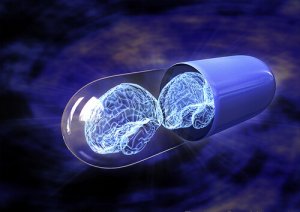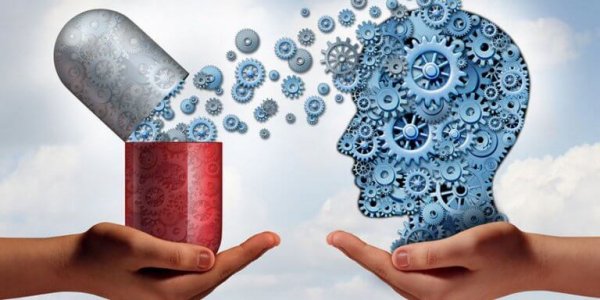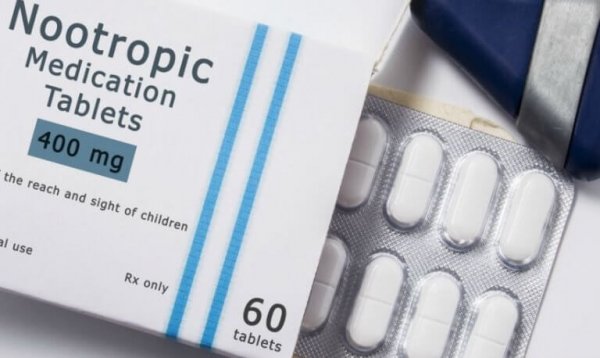Nootropics - What are they and can they make you Smarter?


Written and verified by the psychologist Gema Sánchez Cuevas
Nootropics are also known as “smart drugs” because of the benefits they claim to offer, which are significant. Proponents say they increase mental capacity and enhance cognitive function. Their popularity in the last few years has skyrocketed. Thousands of people now include this little gold pill with their breakfast to make themselves more productive at work.
To put nootropics in context, all you have to do is remember the movie Limitless. In the film, Bradley Cooper took an experimental drug called “NZT-48.” Shortly after taking it his world became more alive. His senses sharpened and his cognitive function ran at 200%. He was able to easily learn multiple languages, dominate on Wall Street, and remember everything had seen, read, and heard.
Presumably the child brain is someting like a notebook as one buys it from the stationers. Rather little mechanism, and lots of blank sheets.”
-Alan Turing-
Something like this seems like it would help you be more productive than Stephen King writing novel after novel. You could memorize a subject in half the time, or active the neuronal structures that wake up the mathematical or musical genius inside you. We say “seems’ because the truth is not quite as amazing as all that. The reality of the drug’s effects is limited and less impressive, but still interesting.
The pharmaceutical industry, for example, invests millions of dollars every year to develop new nootropics. They do this for a very simple reason – demand is rising.
The pressure at work gets more intense all the time. We all know it. You have to be alert, you have to improve your concentration and be more mentally agile. Your work wants you to be more creative, more productive… Everyone would like to be able to give more without resorting to dangerous substances. That’s where nootropics, or “smart drugs,” come in.
We know today that university students, military pilots, computer programmers, and creative marketing designers frequently consume these seemingly innocuous drugs. They want to expand their minds, focus their attention, and do their best.
The question is… Do nootropics really work?

Nootropics – an accidental discovery that led to “smart drugs”
Some people call nootropics “the drug of the future.” It’s a product of a fast-paced society that wants to challenge the limits of possibility. However, proponents don’t like or accept this term because they usually don’t have any adverse side-efforts. Nor are they psycho-stimulants. They do have another, more inspiring name, which is “cognitive enhancers.”
There are also people who venture to say that soon, nootropics will be on our evolutionary menu. Their idea is that they will help us get to the next level of brain development.
As curious as it sounds, this is exactly the proposal of large businesses and well-known organizations. In fact, Silicon Valley, the world capital of the tech industry, has been working with nootropics for years. They have even found new mechanisms by which they can intensify their properties and, as a result, their duration and usefulness.
They won’t be just to improve attention and creativity. They have made it possible to experience lucid dreams or levels of relaxation similar to those who practice meditation for years. For many of our readers these claims seem like pure science fiction. That’s why we need to take it step by step. So what’s the origin of nootropics?
From sleep aids to attention activators
Let’s go back to the 60s, in a Belgian lab called “Union Chimique Belge.” The Romanian neuropharmacologist Corneliu Giurgea was working on a synthesis of diverse chemical compounds with one goal in mind – to induce sleep.
However, what he discovered was actually a special type of molecule that allowed him to create the first ever nootropic. This was Piracetam. This drug did not reduce neuronal excitability or promote sleep. In fact, it did just the opposite. It put the mind on alert and improved cognitive functions like memory and concentration.
- The chemical modulation of neurotransmitters like acetylcholine and glutamate are what make this possible. The amazing thing is that they do it without adverse side-effects.
- Corneliu Giurgea’s Piracetam was quickly commercialized, which meant that other similar drugs came on the market soon after. Oxiracetam, Aniracetam, Pramiracetam, and Phenylpiracetam to name a few.
The mechanism of action in nootropics varies from one to the other. However, most of them effect vasodilation, which means they improve blood flow to the brain. Increased blood flow means more oxygen, more nutrients, and more glucose. Glucose is the essential source of energy that the brain uses for long periods of concentration.

Likewise (and this is interesting to consider) we know that in Silicon Valley they are working with nootropics in combination with biohacking. In other words, they are trying to use different chemicals to “hack” certain brain functions and enhance cerebral performance.
It seems like we might just be turning the key in the door to the next evolutionary jump in our brains…
What effects do nootropics have? Are they as beneficial as they seem?
The goal of the pharmaceutical industry with nootropics is two-fold. First, as we know, they want to improve our basic cognitive processes. And most of the time, they succeed. Secondly, they want nootropics to act as neuroprotectors and to have minimal (if not nonexistent) side effects.
One of the primary problems that health experts are seeing with nootropics is that stressed college students, business people, etc., are buying them on the internet. They aren’t too concerned about where they are coming from or, what’s worse, how they are supposed to consume them.
Here’s an example. Caffeine is a natural nootropic, just like omega-3 fatty acids. If I drink 10 cups of coffee in one night, I will probably have headaches, dizziness, and high blood pressure. Similarly, the student buying nootropics on the internet has no idea what they’re made of or the proper dose. He is just buying it to pass his exam tomorrow. So, it’s very likely he will experience adverse side-effects before any of the benefits like improved attention and memory.

It is important to understand that while nootropics can help, they are not a cure-all. In addition, you will only feel the benefits if you know how to take them. You should always follow the advice of an expert.
An interesting side note is that Russian laboratories have created a new family of nootropics. These are derived from the stress-hormone corticotropin, and GABA receptors like Phenibut or Tolibut. These drugs are in high demand lately for their relaxing and anti-stress properties. However, it is important to note that their side effects are undoubtedly the most dangerous on the market because they cause dependency in the long-term.
How to use nootropics
Experts say that there are some basic guidelines you should follow if you want to take any kind of nootropic.
- Find the nootropic that best meets your needs.
- Consult a specialist who can tell you about the options that exist in the market.
- Each person has a unique neurochemistry. In general, you should start with very low doses of nootropics. Try different ones until you find what’s right for you.
- If you experience any kind of side-effects like headaches or dizziness, stop using the drug immediately.
- Likewise, you have to remember that these drugs do not take effect immediately. The brain needs time to get used to them. In fact, you won’t notice the effects until a few days or weeks after you start taking them.

They only work if you have a proper diet and avoid a sedentary lifestyle
If you want to regulate your brain chemistry to maximize its function, you need to eat a healthy diet. There are certain nutrients that activate the mechanism of action of smart drugs. So, a balanced diet with lots of fresh fruits, vegetables, and omega-3 and omega-6 fatty acids, is essential for the nootropics to work.
- Also, if you live a sedentary lifestyle, your metabolism will be slow and less efficient. As a result, your liver won’t be able to fully process the components of the nootropic.
Exercise and a balanced diet low in saturated fat are essential for nootropics to work properly.
“The true sign of intelligence is not knowledge but imagination.”
-Albert Einstein-
Types of nootropics
It is important to understand that not all nootropics are drugs. Many nootropics don’t require a prescription because they are comprised of natural ingredients. Some are very easy to find in an herbalist’s shop. That being said, it’s important to consult a specialist before taking any kind of cognitive stimulant.
You should know what you are looking for because, as we’ve seen, there is a wide variety of nootropics. And it seems like we will see even more in the coming years. Currently, there are nootropics in the following categories:
- Mood enhancers
- Nootropics to improve concentration
- Anti-anxiety nootropics
- Nootropics to improve memory
- Improving rest, recovery, and sleep
- Nootropics for anti-aging and longevity

In conclusion, don’t forget that nootropics are not dietary supplements. You shouldn’t take them lightly, especially because there are more available all the time and their effectiveness is questionable. We know that we would all like to enhance our cognitive function to meet the demands of the job market. That being said, it’s always better to look for alternative strategies to achieve those goals.
Nevertheless, we will keep tabs on the evolution of these cognitive enhancing drugs and their impact on our future.
Bibliographic References:
Ruiz Franco, J. (2005). Drogas Inteligentes. Editorial Paidotribo.
Evan Brand (2016) The Everything Guide To Nootropics. Berkley Books
Nootropics are also known as “smart drugs” because of the benefits they claim to offer, which are significant. Proponents say they increase mental capacity and enhance cognitive function. Their popularity in the last few years has skyrocketed. Thousands of people now include this little gold pill with their breakfast to make themselves more productive at work.
To put nootropics in context, all you have to do is remember the movie Limitless. In the film, Bradley Cooper took an experimental drug called “NZT-48.” Shortly after taking it his world became more alive. His senses sharpened and his cognitive function ran at 200%. He was able to easily learn multiple languages, dominate on Wall Street, and remember everything had seen, read, and heard.
Presumably the child brain is someting like a notebook as one buys it from the stationers. Rather little mechanism, and lots of blank sheets.”
-Alan Turing-
Something like this seems like it would help you be more productive than Stephen King writing novel after novel. You could memorize a subject in half the time, or active the neuronal structures that wake up the mathematical or musical genius inside you. We say “seems’ because the truth is not quite as amazing as all that. The reality of the drug’s effects is limited and less impressive, but still interesting.
The pharmaceutical industry, for example, invests millions of dollars every year to develop new nootropics. They do this for a very simple reason – demand is rising.
The pressure at work gets more intense all the time. We all know it. You have to be alert, you have to improve your concentration and be more mentally agile. Your work wants you to be more creative, more productive… Everyone would like to be able to give more without resorting to dangerous substances. That’s where nootropics, or “smart drugs,” come in.
We know today that university students, military pilots, computer programmers, and creative marketing designers frequently consume these seemingly innocuous drugs. They want to expand their minds, focus their attention, and do their best.
The question is… Do nootropics really work?

Nootropics – an accidental discovery that led to “smart drugs”
Some people call nootropics “the drug of the future.” It’s a product of a fast-paced society that wants to challenge the limits of possibility. However, proponents don’t like or accept this term because they usually don’t have any adverse side-efforts. Nor are they psycho-stimulants. They do have another, more inspiring name, which is “cognitive enhancers.”
There are also people who venture to say that soon, nootropics will be on our evolutionary menu. Their idea is that they will help us get to the next level of brain development.
As curious as it sounds, this is exactly the proposal of large businesses and well-known organizations. In fact, Silicon Valley, the world capital of the tech industry, has been working with nootropics for years. They have even found new mechanisms by which they can intensify their properties and, as a result, their duration and usefulness.
They won’t be just to improve attention and creativity. They have made it possible to experience lucid dreams or levels of relaxation similar to those who practice meditation for years. For many of our readers these claims seem like pure science fiction. That’s why we need to take it step by step. So what’s the origin of nootropics?
From sleep aids to attention activators
Let’s go back to the 60s, in a Belgian lab called “Union Chimique Belge.” The Romanian neuropharmacologist Corneliu Giurgea was working on a synthesis of diverse chemical compounds with one goal in mind – to induce sleep.
However, what he discovered was actually a special type of molecule that allowed him to create the first ever nootropic. This was Piracetam. This drug did not reduce neuronal excitability or promote sleep. In fact, it did just the opposite. It put the mind on alert and improved cognitive functions like memory and concentration.
- The chemical modulation of neurotransmitters like acetylcholine and glutamate are what make this possible. The amazing thing is that they do it without adverse side-effects.
- Corneliu Giurgea’s Piracetam was quickly commercialized, which meant that other similar drugs came on the market soon after. Oxiracetam, Aniracetam, Pramiracetam, and Phenylpiracetam to name a few.
The mechanism of action in nootropics varies from one to the other. However, most of them effect vasodilation, which means they improve blood flow to the brain. Increased blood flow means more oxygen, more nutrients, and more glucose. Glucose is the essential source of energy that the brain uses for long periods of concentration.

Likewise (and this is interesting to consider) we know that in Silicon Valley they are working with nootropics in combination with biohacking. In other words, they are trying to use different chemicals to “hack” certain brain functions and enhance cerebral performance.
It seems like we might just be turning the key in the door to the next evolutionary jump in our brains…
What effects do nootropics have? Are they as beneficial as they seem?
The goal of the pharmaceutical industry with nootropics is two-fold. First, as we know, they want to improve our basic cognitive processes. And most of the time, they succeed. Secondly, they want nootropics to act as neuroprotectors and to have minimal (if not nonexistent) side effects.
One of the primary problems that health experts are seeing with nootropics is that stressed college students, business people, etc., are buying them on the internet. They aren’t too concerned about where they are coming from or, what’s worse, how they are supposed to consume them.
Here’s an example. Caffeine is a natural nootropic, just like omega-3 fatty acids. If I drink 10 cups of coffee in one night, I will probably have headaches, dizziness, and high blood pressure. Similarly, the student buying nootropics on the internet has no idea what they’re made of or the proper dose. He is just buying it to pass his exam tomorrow. So, it’s very likely he will experience adverse side-effects before any of the benefits like improved attention and memory.

It is important to understand that while nootropics can help, they are not a cure-all. In addition, you will only feel the benefits if you know how to take them. You should always follow the advice of an expert.
An interesting side note is that Russian laboratories have created a new family of nootropics. These are derived from the stress-hormone corticotropin, and GABA receptors like Phenibut or Tolibut. These drugs are in high demand lately for their relaxing and anti-stress properties. However, it is important to note that their side effects are undoubtedly the most dangerous on the market because they cause dependency in the long-term.
How to use nootropics
Experts say that there are some basic guidelines you should follow if you want to take any kind of nootropic.
- Find the nootropic that best meets your needs.
- Consult a specialist who can tell you about the options that exist in the market.
- Each person has a unique neurochemistry. In general, you should start with very low doses of nootropics. Try different ones until you find what’s right for you.
- If you experience any kind of side-effects like headaches or dizziness, stop using the drug immediately.
- Likewise, you have to remember that these drugs do not take effect immediately. The brain needs time to get used to them. In fact, you won’t notice the effects until a few days or weeks after you start taking them.

They only work if you have a proper diet and avoid a sedentary lifestyle
If you want to regulate your brain chemistry to maximize its function, you need to eat a healthy diet. There are certain nutrients that activate the mechanism of action of smart drugs. So, a balanced diet with lots of fresh fruits, vegetables, and omega-3 and omega-6 fatty acids, is essential for the nootropics to work.
- Also, if you live a sedentary lifestyle, your metabolism will be slow and less efficient. As a result, your liver won’t be able to fully process the components of the nootropic.
Exercise and a balanced diet low in saturated fat are essential for nootropics to work properly.
“The true sign of intelligence is not knowledge but imagination.”
-Albert Einstein-
Types of nootropics
It is important to understand that not all nootropics are drugs. Many nootropics don’t require a prescription because they are comprised of natural ingredients. Some are very easy to find in an herbalist’s shop. That being said, it’s important to consult a specialist before taking any kind of cognitive stimulant.
You should know what you are looking for because, as we’ve seen, there is a wide variety of nootropics. And it seems like we will see even more in the coming years. Currently, there are nootropics in the following categories:
- Mood enhancers
- Nootropics to improve concentration
- Anti-anxiety nootropics
- Nootropics to improve memory
- Improving rest, recovery, and sleep
- Nootropics for anti-aging and longevity

In conclusion, don’t forget that nootropics are not dietary supplements. You shouldn’t take them lightly, especially because there are more available all the time and their effectiveness is questionable. We know that we would all like to enhance our cognitive function to meet the demands of the job market. That being said, it’s always better to look for alternative strategies to achieve those goals.
Nevertheless, we will keep tabs on the evolution of these cognitive enhancing drugs and their impact on our future.
Bibliographic References:
Ruiz Franco, J. (2005). Drogas Inteligentes. Editorial Paidotribo.
Evan Brand (2016) The Everything Guide To Nootropics. Berkley Books
This text is provided for informational purposes only and does not replace consultation with a professional. If in doubt, consult your specialist.







